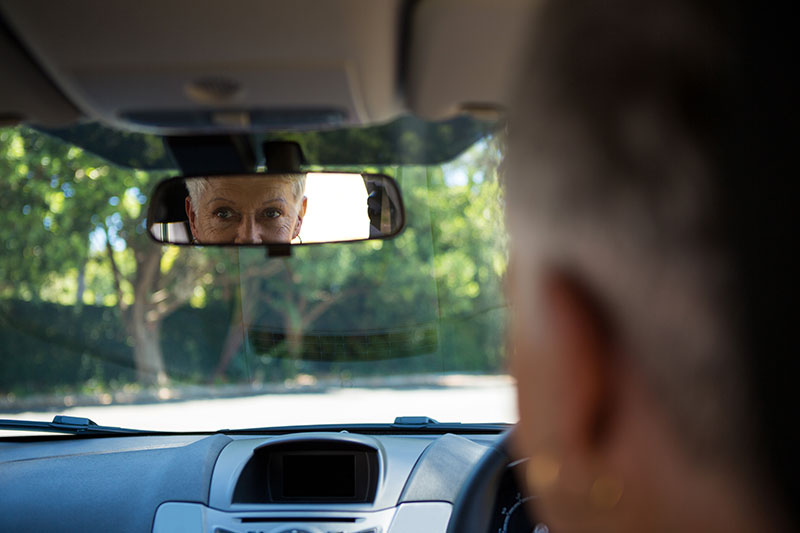What to Do When It’s Time to Take Away an Elderly Loved One’s Car Keys
It’s a hard conversation that no one wants to have, but when your senior loved one is no longer safe on the road, they put everyone at risk, including themselves. Fatal accident rates begin to rise sharply at age 70, yet only one state (Illinois) requires older drivers to retake their driving test at license renewals. So it typically falls on friends and family members to decide when it’s time for a senior to give up their car keys.
If you feel like it’s time to address your loved one’s safety on the road, here are some tips to help the transition go as smoothly as possible.
Signs that it’s time for a senior to stop driving
The first step is to be aware of the signs that indicate it might be time for a conversation about your loved one’s driving. Take a few drives with them to gauge their awareness and responsiveness. If they have frequent close calls, slowed reactions to unexpected situations, or difficulty following traffic signals, these are all signs that they should not be behind the wheel.
You may also notice that they tend to get lost in familiar areas or are easily overwhelmed by traffic or busy intersections. Unexplained dents or scratches on their vehicle can be a warning sign as well, indicating that they’re frequently bumping into objects, like carts in parking lots or trash cans in driveways.
Impairments that may affect driving abilities
There are also some health issues and medications that can impair seniors’ driving capabilities. Reduced eyesight, hearing loss, slowed reaction times, and cognitive impairments like dementia or Alzheimer’s can significantly impact driving skills.
In addition, many medications can cause drowsiness or confusion and should not be taken while driving, including cold and allergy meds, antidepressants, opioids, and sleeping pills.
How to start the conversation
It’s a sensitive topic — most seniors are highly reluctant to lose this aspect of independence. And who can blame them? No one wants to rely solely on others to get around, especially if they live far away from family or in a rural area with few public transportation or rideshare options. But allowing a senior to continue to drive when they are no longer capable of doing so safely risks their health and safety and that of other drivers, cyclists, and pedestrians.
It’s best to have the conversation in a comfortable, familiar environment and allow plenty of time for your loved one to process and ask questions. Keep in mind that, while approaching them with other family members can signal solidarity, it can also make your loved one feel ganged up on.
Sensitivity and empathy are key here. Start by expressing your concerns calmly and clearly, focusing on your fears for their safety rather than their age or abilities. It’s important to listen to their perspective and acknowledge their feelings — this will likely be a massive life change for them. Finally, don’t expect to settle everything with one conversation. It may take ongoing dialogue for them to understand and accept the need to give up their keys.
They may also be unfamiliar with rideshare and public transportation options, so make sure you go over these alternative methods of transportation so they understand that losing their license doesn’t mean they’re homebound. If none of these options are available in their area, you might want to set up a plan with family members and friends to take turns driving your loved one regularly.
Involving their doctor
If you know that your loved one will be resistant or even hostile to the idea of giving up driving, you may want to start by talking to their doctor. They likely trust their doctor and will at least listen to what they have to say. The doctor can assess their physical and mental abilities and offer an objective opinion. They can also discuss how certain health conditions or medications might affect driving safety.
Suggesting a driving test retake
Depending on your loved one’s personality, they may feel the need to “prove” that they are still safe to drive. In this case, you can propose a driving assessment or a refresher driving course. It’s a diplomatic way to evaluate their driving skills and will either provide reassurance about their driving abilities or confirmation of their impairments by an impartial third party.
Exploring legal options
If your loved one refuses to stop driving despite clear safety risks, you may need to take more drastic measures to protect them as well as others on the road. You can file an “unsafe driver” report with your local Department of Motor Vehicles (DMV), explaining why you feel that your loved one should no longer be driving. The DMV will contact them for additional testing to evaluate their abilities and may limit or revoke their license depending on the findings.
How Right Hand Care can help
At Right Hand Care, we understand how difficult it can be for everyone involved when a senior can no longer drive safely. Our compassionate in-home caregivers can help support your loved one through this loss of independence by providing comforting companionship and assistance with daily activities. If you’re concerned that your loved one may still try to drive, we can also provide a watchful eye to help ensure their safety, giving you greater peace of mind.
With Right Hand Care, you can be confident that your loved one is in safe hands, receiving the care and support they need to navigate life’s changes. For more information on our services or to set up a care plan, contact us today.

We are Superheroes in Comfortable Clothes™
We take care of our clients, their families, our staff, and our league of franchise owners.

